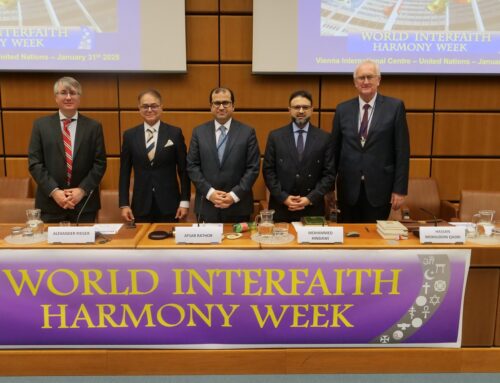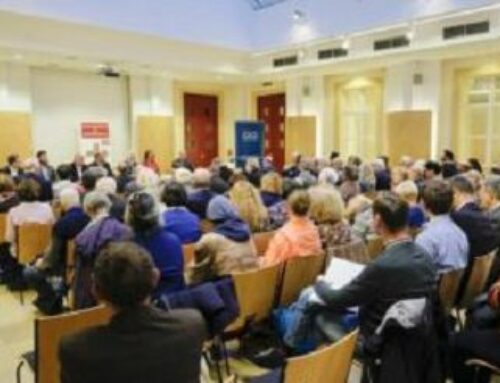Conclusion document
Spirituality and Justice Initiative – Vienna UN Meeting October 7th 2019
Preface
We, the supporters of the Coalition of Faith based organizations, hereby declare, that we offer ourselves to the service for human dignity and human rights. Human dignity has no color, no religion, no citizenship, no gender and no age. To promote this fundamental dignity of mankind we are prepared to assist UN-programs.
This text concentrates on the topic of the UN Crime Congress in Kyoto from 20 to 27 April 2020. So we dedicate ourselves to assist a general education to justice in our religious communities. We know that we can create an atmosphere of trust and hope, in which this education can be offered quite reliable, especially also to young people. We are flexible in our actions and able to link the grass route teachings to advocacy. This text is our offer to the UN actions, to education for justice and to improve human rights all over the world. It´s up the UN to value our offer and to respond to our initiative. As religions are not primarily the source of problems but mainly – and often forgotten – part of the solution we organize ourselves as potential partners of the UN. It´s time to start a new chapter of interaction and self-commitment for our cooperation with the UN.
TEXTS
APPROPRIATE PUNISHMENT AND RESOCIALIZATION OF OFFENDERS
(prevention of crime and humane treatment of offenders in prisons and alternative noncustodial measures) (P2)
All faiths have a concept of interconnectedness or brother-/sisterhood among all humans or even all beings. Out of this realization arises the wish to care for both oneself and all others, knowing that ultimately, everybody will benefit. Even if judgement and systems of punishment are used in our day-to-day lives, it is the duty of religious groups to remind us that inherently, every being has the potential to be good, and nobody should be reduced to his or her bad actions only. Spiritual communities provide a space where compassion can be practiced with the support of others.
Although the Bible (Decalogue) and the sacred texts of other religions clearly criminalize murder, stealing, robbery, rape, and lying, these scriptures also prescribe mercy, forgiveness, and compassion. The oldest texts (Deuteronomy 27:19 and Psalm 8:2) recognize the plight of the „weak and needy“ and admonish „anyone who withholds justice from the foreigner, the fatherless, or the widow.“ The Beatitudes explicitly make visiting a prisoner a virtue. Even thieves can be forgiven. Restitution, forgiveness, and compassion are seen as the appropriate responses, in most religions, particularly for the poor and needy.
Modern notions for the treatment and rehabilitation of offenders are now contained in the Mandela Rules adopted by the United Nations General Assembly. Resocialization, reintegration into society. education and vocational training, and „strengthening moral character“ are now seen as major purposes of penal institutions. For this reason, religious services and pastoral visits in private are explicitly recognized in the Mandela Rules (Rule 65). The promotion of spirituality, self-examination, and a commitment to reform are deemed important by prison authorities. Alternatives to imprisonment, or imprisonment for the shortest period of time, with the goal of an early supervised release into the community should be available to the non-violent offender. Community agencies should be enlisted in the task of social rehabilitation of prisoners (Rule 88). The Rules also recommend a maximum size for institutions and that youth should never be placed in prisons. Special programs for the drug-addicted, mentally handicapped, and elderly should be established. Keeping families together, visits to prisoners and a child friendly environment are main requirements for these programs.
Prisoner follow-up services should be organized, which may include monitoring by a religious representative.
We know that creating a good community is best for not getting criminal, religious communities are qualified to give the necessary security for this community building. There are three steps to realize:
1) to educate the community to accept offenders in them
2) to encourage people to talk about themselves and their problems
3) to empower the communities by trusting this process
Interreligious activities are also a joined platform for these community building activities. We also refer to the need of accessibility to prisons to be able to contact and integrate offenders. Resources for building smaller groups would be helpful to initiate trust building processes on a regular basis also in prisons.
And again in consensus with the UN we declare that death penalty is rejected by the FBOs. Its only right of god and nature to take life, never the right of a state or other humans.
We believe that we are called to a specific order for FBO: The ISIS (DAESH) people are now mainly prisoners. We have to ask about them and to claim for access for religious care in their prisons as a basic requirement for resocialization work.
COMPASSION, EMPATHY AND SOCIAL JUSTICE
(alleviation of poverty; promotion of UN Sustainable Development Goals) (P4)
Nearly all the world’s religions have the basic principle „do unto others, as you would have them do unto you“ (a golden rule found in, among others, African transitional religions, Buddhism, Christianity, Confucianism, Hinduism, Islam, Jainism, Judaism, Mormons, Native American beliefs, Sikhism, Taoism, Unification Church). Two corollaries of that principle are found in most religions: that helping others, especially the poor, is the highest form of selflessness, all persons are responsible for one another. Further, in all faiths, persons are to be treated with respect; the generous are blessed; exploitation is explicitly condemned; and advocacy of behalf of those less fortunate is to be praised. Most religions have tenets which hold individuals accountable for their actions and inactions. We know that compassion is more than pure empathy. A true reaction and connection to the other is needed. To teach this is our duty.
In most religions, equity for all persons, male and female, rich and poor, of any race, class or caste, is now proclaimed. The major religions have accepted the principles of the United Nations Universal Declaration of Human Rights, Child Rights Convention, and the Women Rights Conventions. Special care for woman and children has always been a basic duty of most religions. The Secretary-General has stated that without the basic kindness on which all faiths are based, the superstructure of social norms and laws cannot stand.
Tolerance, even toward believers of another faith, has now been accepted through several inter-religious declarations.
Social justice is rooted in the religious virtues of charity, goodness, and love, assistance to the poor, the many health and educational institutions, and the fundamental critique of the rich. Moreover, programs for HIV/AIDS sufferers, youth at risk, vocational training, and victim assistance have been part of the work of faith-based organizations for many years. Prison visitation and the reintegration of prisoners into society are well-known biblical directives. Access for religious care in all prisons is inevitable and may be organized in an interreligious manor.
Criminal Justice, Ethics and Governance: The Relevance of FBOs
(ethics education and creation of a culture of lawfulness) (P1)
At its core the concept of justice is linked to spiritual and moral traditions, and these traditions have directly or indirectly impacted public policy as it applies to criminal justice. To maintain their legitimacy, criminal justice institutions—departments of justice, law-enforcement agencies, the courts, etc. —must be based upon and must act in accordance with core moral, even spiritual principles that are widely respected by citizens. Whether construed as “fairness” or as “righteousness,” justice is a moral and, for many, a spiritual principle. The religions of the world have advocated justice for millennia, and most religious traditions have promulgated not only broad principles, but also legal systems such as canon law, sharia courts, laws of Manu, Deuteronomic codes, and, of course, ten commandments. For the most part, religious perceptions of justice are either foundational for, or at least consistent with most aspects of a-religious criminal justice systems. With this in mind, this working group will explore a variety of religious perspectives on justice, as well as the causes and responses to crimes. The key issue is inclusivity: All we do is a commitment to the FBO, and we need the faith perspective from start on to be integrated in all our proposals.
Religious traditions also have articulated a vision of a good society, one that is well-governed, inclusive, harmonious, avoiding excessive inequalities, oppression, discrimination, that is, a society that addresses and at least mitigates some of the root causes of crime that may include economic injustices, family breakdown, political corruption, exploitation, failing or ill-funded educational institutions, etc. This demands us to the vision, that education to justice is the key issue: by this we will be able to transform our societies so that a clear “no to corruption” will be the base of all social actions. Therefor we need not only a financial but also a spiritual training for pre scholars, high school pupils and for university students. The aim is to change the mind set of people. We have to make a self-commitment as example givers. There is no chance to fight corruption only by laws, but primarily by spirituality and ethics. This has to be guaranteed by an informal education level i.e. church, temple and mosque groups. Themes like corruption are discussable open-minded if a confident setting is guaranteed.
The session will solicit from the panelists, as well as from the audience, recommendations for building constructive beneficial partnerships between FBOs and criminal justice institutions, including state, local, national and international institutions, from city halls to the United Nations. What kind of reforms—political, economic, social, legal—-may be in order to improve the mechanisms of criminal justice. Special attention will also be given to recommendations that may be relevant to the United Nations Office of Drugs and Crime, for example the Doha Declaration’s emphasis on a “culture of lawfulness”, as well as to the United Nations Sustainable Development Goals, specifically SDG #16, which calls for the promotion of “peaceful and inclusive societies” that “provide access to justice for all and build effective, accountable and inclusive institutions at all levels.” In all our attempts and educational activities the bodies of governance should be included from the beginning.
A special obligation for us is the fact, that ISIS (DAESH) wives and children with more than 65.000 people are held in prison camps. We know that especially in these camps a bad teaching will be the root for further terroristic seeds. There we have to engage ourselves with the help and the cooperation of UNHCR and other UN-bodies. In surroundings like these camps our chance as FBO´s is to work together against misdevelopments in one’s own religion. Our own Coalition will be able to support each other with one’s own experiences. So the FBO itself will be a learning organization.
Restorative Justice and victim assistance
(establishment of social justice and implementation of the UN Rules for the Treatment of Victims) (P3)
Forgiveness, healing, human transformation, reconciliation, restitution, and support to the victims of crime find resonance in many religious traditions, including Buddhism, Christianity, Confucianism, Navajo peace-making courts, and Pacific Island reconciliation systems, and Taoism.
Most legal cultures are based on retribution and punishment. However, criminologists have found that restorative justice, where offenders are allowed to understand the harm they have caused and to make amends, is a much more effective way of resocialization. This process may start in prison, continue after release, or even be an alternative to imprisonment under the appropriate conditions. Greater attention to the long-term, psychological, and even material harm done to victims should be provided for in the current criminal justice system in a meaningful way. Spiritual Mediation is the primarily helpful method of restorative justice in religious circles. We create an atmosphere of appreciation of respect and truth. It´s not only about correctively correct consequences, but about a spiritual and emotional understanding of the consequences of one’s own deeds. Religious circles are able to create emotional atmosphere. There offenders can open their hearts. Restorative justice is the holistic goal of fair justice: FBO´s are able to give space for confrontation of offender and victim in a secured spiritual surrounding.
If reconciliation, restitution, and forgiveness are impossible, a robust system of social support to victims should be established, which may include assistance by FBOs. Of course, violence and crime are best tackled by prevention programs, teaching tolerance and respect for all others, better education at every level and empowerment of the vulnerable. Inequality, social injustice, unemployment, discrimination, the lack of mental health facilities, training and educational opportunities, even suitable housing and basic necessities all contribute to conditions of resentment, violence, and crime. Faith-based organizations have an obligation to see that „no one is left behind“ and to advocate for such programs as the UN sustainable development goals, and Principles of Restorative Justice. To teach humanity and help transformation of heart are the central elements of FBO work in assisting UN goals.
On October 7th 2019 we the signatories founded the European Coalition of Faith Based Organizations in Vienna with the aim to bring spiritual and religious competence into UN programs.




Hinterlasse einen Kommentar